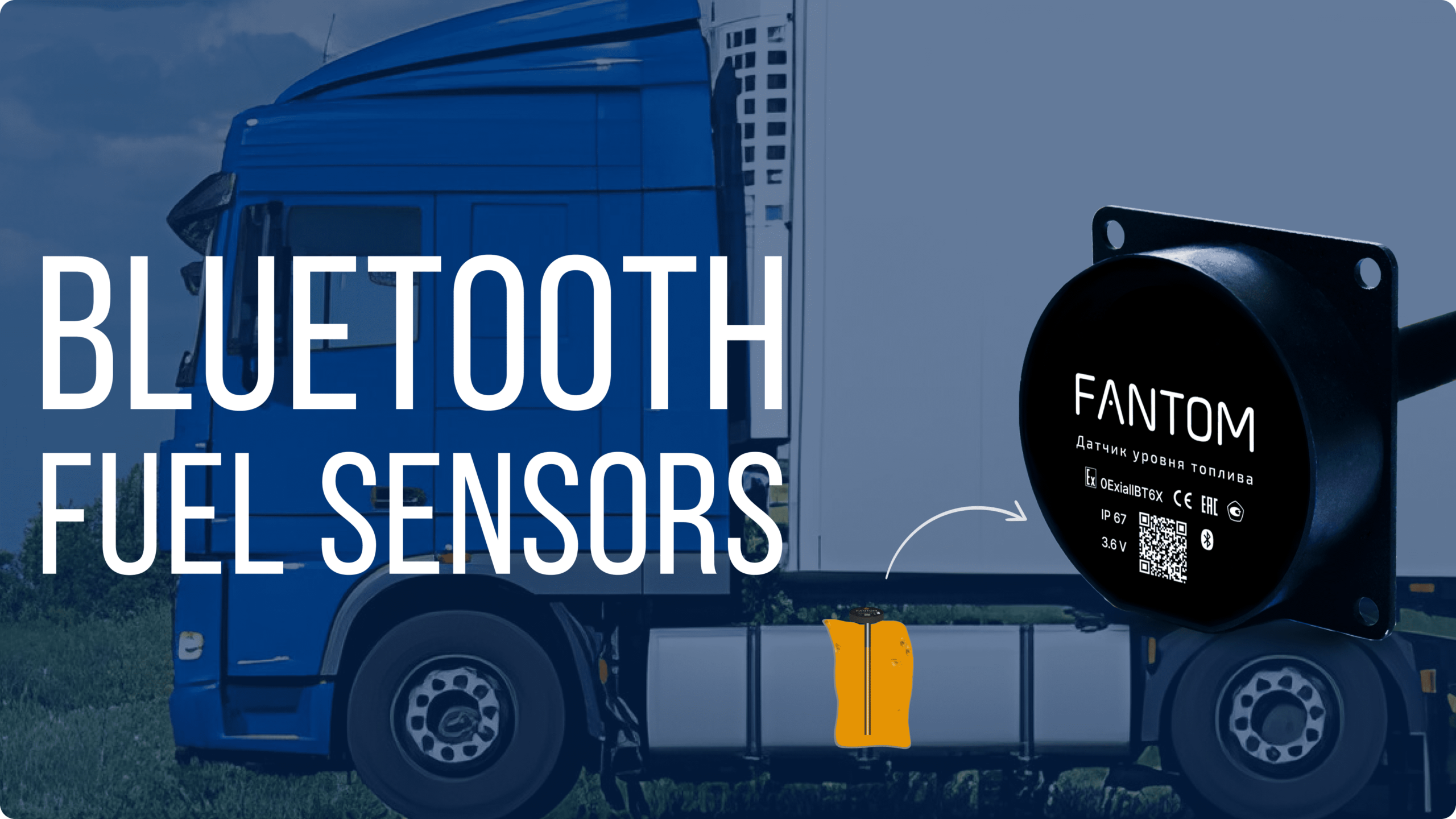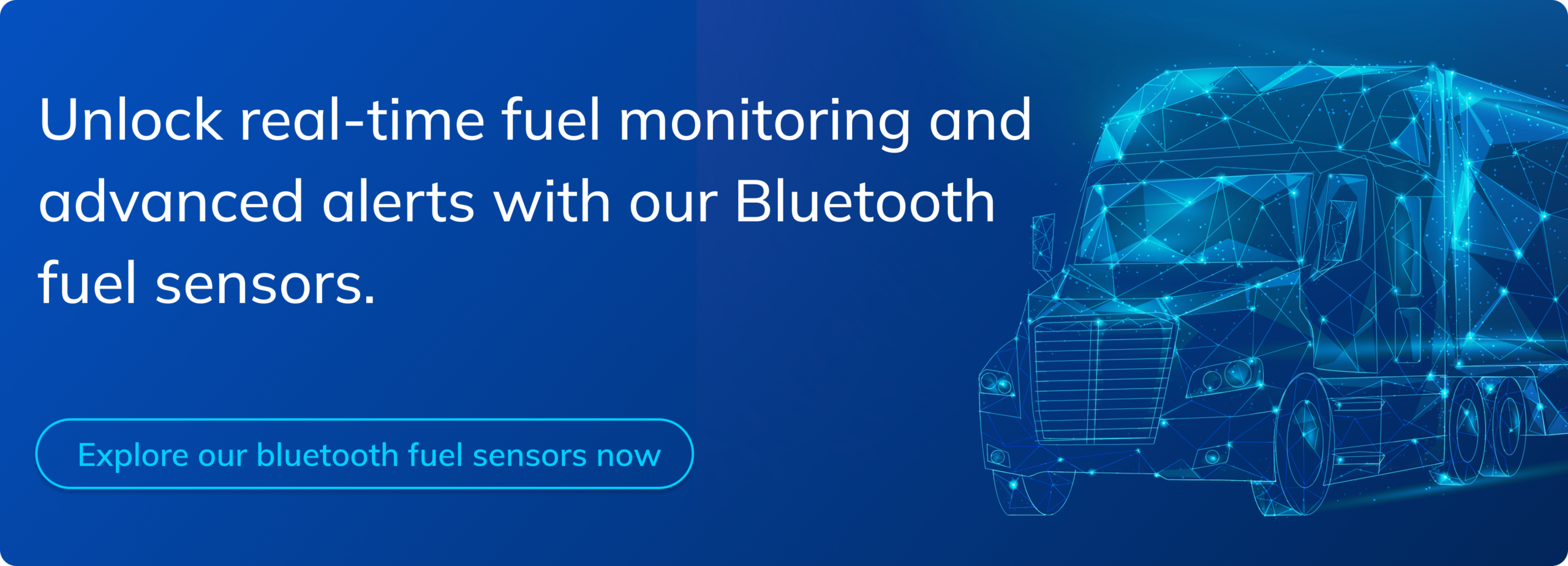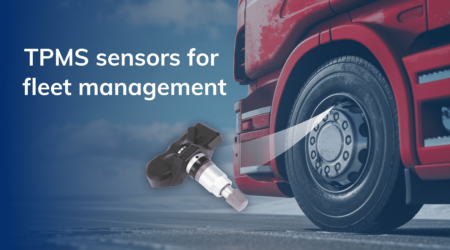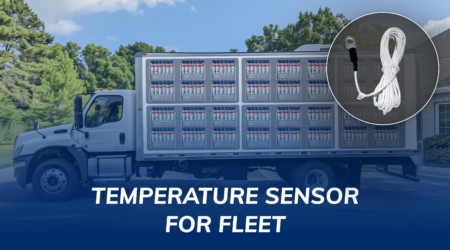How Do Bluetooth Fuel Sensors Improve Fleet Efficiency?

For many fleet managers, controlling fuel costs is a crucial yet challenging task. Despite optimizing routes and training drivers, many managers still face unexpectedly high fuel bills without a clear reason. This common issue often leaves them searching for answers. It highlights the need for deeper insights into fuel consumption. It’s not just about tracking the amount used. It is also about understanding the factors behind fuel usage. Factors such as vehicle performance, driving behaviors, and potential fuel theft are essential to be . Accurate real-time data is key to identifying inefficiencies and improving overall fleet efficiency. This blog will explore the challenges of managing fuel costs and the strategies to optimize fuel consumption, offering valuable insights for better decision-making.
What Are Bluetooth Fuel Sensors?
Bluetooth fuel sensors are small, wireless devices that are put in a vehicle’s fuel tank. They use Bluetooth technology to send data about the fuel levels to your phone or computer in real time. This means you can always know exactly how much fuel is in each vehicle without having to check manually.
How Do Bluetooth Fuel Sensors Work?
Bluetooth fuel sensors provide a practical and user-friendly solution for monitoring fuel levels in fleet vehicles. These sensors connect wirelessly to your system using Bluetooth. By that it makes installation quick and simple without the need of wires. They offer real-time updates on fuel levels, ensuring fleet managers have the most current information at their fingertips. It is compatible with a variety of fuel types, including diesel, gasoline, petrol, and kerosene. Moreover, these sensors are versatile and suitable for different vehicles.
In addition to basic monitoring, Bluetooth fuel sensors provide advanced alerts if there’s an unexpected drop in fuel levels. This could signal theft, or show if the fuel levels are getting low. They can store data even when there is no signal, ensuring that important information is not lost. The sensors can also perform self-checks to detect any issues or impurities in the fuel, helping to maintain vehicle efficiency. They are equipped to measure the vehicle’s angle to ensure accurate readings. Even on slopes or uneven surfaces. With a flexible design, these sensors can easily fit into various tank shapes and sizes. This helps in making them adaptable for a wide range of applications.
Why Are Bluetooth Fuel Sensors Important?
1. Better Fuel Monitoring
With Bluetooth fuel sensors, you get precise and continuous updates about fuel levels. This helps you keep track of every drop of fuel and reduces the chances of theft or wastage.
2. Improved Fuel Efficiency
By looking at the data from these sensors, you can find out if drivers are wasting fuel by idling too long or driving too aggressively. Fixing these issues can save a lot of fuel.
3. Real-Time Alerts
These sensors send you alerts right away if something is wrong, like if someone is stealing fuel or if a vehicle is using too much fuel. This lets you act quickly to stop further losses.
4. Smooth Operations
With real-time data, you can plan fuel stops better, reducing downtime and keeping your fleet running smoothly.
5. Accurate Data
Traditional sensors can sometimes give wrong readings. Bluetooth fuel sensors are more advanced and provide more accurate data, reducing errors in fuel monitoring.
6. Easy to Integrate and Expand
These sensors integrate effortlessly with your existing fleet management system, allowing for a seamless transition. Additionally, their wireless nature enables you to expand your sensor network as your fleet increases in size.
Addressing Common Concerns
Easy Integration
System integrators often worry about how new devices will fit with their current systems. Bluetooth fuel sensors are designed to work seamlessly with most fleet management software, making integration simple.
Simple Installation and Maintenance
These sensors are easy to install because they are wireless and flexible. They also need very little maintenance, and their self-check feature alerts you to any problems early on.
Data Security
Data security is crucial. Bluetooth fuel sensors use advanced encryption to keep the data safe and ensure it’s only accessible to authorized users.
Cost-Effective
While these sensors might cost more upfront, they save money in the long run by reducing fuel theft, improving fuel efficiency, and lowering maintenance costs.
 Impact
Impact
The implementation of Bluetooth fuel sensors has a profound impact on fleet efficiency. Here are some examples and case studies highlighting the benefits:
Case Study:
Logistics Company: Logistics Company, a leading transportation company, implemented Bluetooth fuel sensors across their fleet of 500 vehicles. Within six months, they reported a 15% reduction in fuel consumption. Real-time monitoring allowed them to identify and address issues such as excessive idling and unauthorized fuel siphoning. The data analytics provided insights into optimizing routes and schedules, further improving fuel efficiency and reducing operational costs.
Example:
Delivery Services Agency: Delivery Services Agency faced challenges with fuel theft and inaccurate fuel monitoring. After installing Bluetooth fuel sensors, they saw a significant reduction in fuel theft incidents. The tamper alerts and real-time notifications enabled quick response to unauthorized access attempts. Additionally, accurate fuel monitoring helped in planning fuel stops more efficiently, reducing downtime and enhancing delivery schedules.
Case Study:
Construction Company: Construction Company operated a fleet of heavy machinery and vehicles, where fuel consumption was a major concern. By using Bluetooth fuel sensors, they gained insights into fuel usage patterns and identified opportunities for improvement. They implemented training programs for drivers to promote fuel-efficient driving practices, resulting in a 12% decrease in fuel consumption and substantial cost savings.
Example:
Transportation Company: Transportation Company, a public transport operator, integrated Bluetooth fuel sensors to monitor fuel levels in their buses. Real-time data allowed them to optimize refueling schedules, reducing the frequency of fuel stops and minimizing service disruptions. This led to improved route efficiency and better service reliability for passengers.
Other Questions Which May Arise:
What are the anti-theft measures provided by Bluetooth fuel sensors?
Bluetooth fuel sensors are equipped with several anti-theft features to prevent unauthorized access and fuel theft. These features include tamper alerts that notify fleet managers of any attempts to interfere with the sensor or fuel tank. Additionally, the sensors can detect sudden drops in fuel levels and send real-time alerts to the central system, allowing immediate action to be taken. These measures help secure fuel resources, reducing financial losses due to theft.
How do Bluetooth fuel sensors integrate with existing fleet management software?
Bluetooth fuel sensors are designed to seamlessly integrate with existing fleet management software. The sensors transmit data wirelessly, which can be received by compatible fleet management systems. This integration allows for a centralized view of fuel levels, consumption patterns, and potential issues across the entire fleet. The compatibility with existing software ensures that fleet managers can incorporate fuel data into their overall management strategy without the need for significant system repairs.
 Future of Bluetooth Fuel Sensors
Future of Bluetooth Fuel Sensors
Smart Technology Integration
In the future, these sensors will connect with other smart devices, creating a network that makes fleet management even easier. AI can analyze the data to predict when maintenance is needed or to find the best routes.
Better Sensors
Newer sensors will be even more accurate and reliable. They might include extra features like temperature monitoring or vibration detection, offering a complete solution for fleet management.
Eco-Friendly Operations
Bluetooth fuel sensors help reduce fuel waste, which is good for the environment. By optimizing fuel usage, they help fleets lower their carbon footprint.
Conclusion
In conclusion, Bluetooth fuel sensors play a vital role in enhancing fleet efficiency by addressing key challenges in fuel management. With real-time monitoring, anti-theft measures, and data analytics, these sensors provide fleet managers with the tools they need to optimize fuel usage, reduce costs, and improve overall operational efficiency. The examples and case studies presented demonstrate the significant impact of Bluetooth fuel sensors on fleet management, showcasing their potential to transform the way fleets are operated. Adopting Bluetooth fuel sensors is a strategic move for any fleet operator looking to achieve greater efficiency, cost savings, and sustainability in their operations.
Implementing Bluetooth fuel sensors is not just about keeping up with technological advancements; it’s about making informed decisions that drive business success. By embracing this technology, fleet managers can ensure that their fleets are not only more efficient but also more competitive in an increasingly demanding market. The future of fleet management lies in smart, data-driven solutions, and Bluetooth fuel sensors are a key component of that future.





